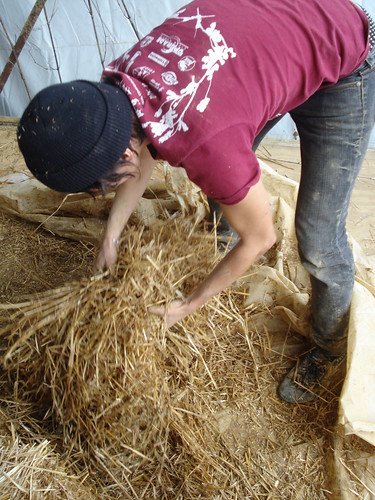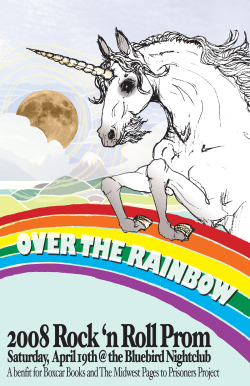Here is an image that Mary made for people to put on their blogs/MySpace pages to promote the Boxcar/Pages Rock N’ Roll Prom.
Category: Uncategorized
scary times, exciting times
This morning, it was storming in Bloomington, with the thunder long and booming, so it sounded like bombs. A few booms were followed by the sounds of sirens, and even though I knew it was just coincidence, the sense of danger, destruction, and things ending did not seem impossible. I read in the New York Times that the number of Americans receiving food stamps is projected to reach 28 million in the coming year, the highest level since the aid program began in the 1960s; when I called my father, he told me that he tells the men in his prison job skills class that the suggestions he has for them are not as good as the ones he could have given last year, and in this comment, about the difficulties one family is facing with healthcare, even in light of increased government support in Indiana. I can’t escape a sense of nervousness on everyone’s faces, whether it’s my friends or people at the grocery store.
Still, I read this article about Barak Obama and mixed-race identity in the New York Times and it made me excited. From the article:
“I think Barack Obama is going to bring these deeply American stories to the forefront,†said Esther John, 56, an administrator at Northwest Indian College in Washington, who identifies herself as African-American, American Indian and white.
“Maybe we’ll get a little bit further in the dialogue on race,†Ms. John said. “The guilt factor may be lowered a little bit because Obama made it right to be white and still love your black relatives, and to be black and still love your white relatives: to love despite another person’s racial appearance.â€
Americans of mixed race say that questions about whether Mr. Obama, with a white mother from Kansas and a black father from Kenya, is “too black†or “not black enough,†as the candidate himself brought up in his speech on March 18, show the extent to which the nation is still fixated on old categories.
“There’s this notion that there’s an authentic race and you must fit it,†said Ms. Bratter, an assistant professor of sociology at Rice University in Houston who researches interracial families. “We’re confronted with the lack of fit.â€
I’m sure that for myself, and for many other people who identify as multi-racial, that we don’t need the New York Times or Barak Obama to validate the stories that are our stories, but I have to say that it is exciting to hear them repeated so publically and personally. I hope, that with every telling, whether it is at a crowded political event, in the national media, amongst friends, or in a fiery confrontation on the street, that this is the first warmth of a burning consciousness that race, like so many things in our world, is something that cannot be ignored, that is complicated, subtle and brutal, that is painful and beautiful and something that we define our collective humanity because of, and not in spite of.
bookmooch and gift economies
Bookmooch is a big supporter of the Midwest Pages to Prisoners Project and they give free points (used to trade books on their site) to Pages so we can request books from their users for people in Prison. Recently, John Buckman, the Bookmooch founder blogged about a proposal for using Bookmooch as an alternative distribution mechanism for independent authors:
Books would be printed “on demand†as mooch requests come in, and we’d pay the postage and printing costs. I’m thinking about using blurb.com, as they produce photo-book quality print-on-demand books, though the price is a bit steep at $21 a book (plus postage, comes to about $24 a book).
Here’s the “experiment in generosity†part:
- if you enjoy the book, and can afford it, please tip the author (with paypal).
- you choose the amount to tip, with a suggestion of $10 (remember, it cost $24 to print and ship)
- you list the book on BookMooch and pass it on to someone else
- if you want to keep the book, we ask that you tip at least the cost of the printing for the book.
- if the book wasn’t that exciting to you, or you simply can’t afford to tip, no problem, but do pass the book onto someone else via BookMooch
- each subsequent moocher of the book is asked to tip the author
The questions I’d like answered with this experiment are:
- can an author afford to self-publish and give away books, and make back the investment through volunteered tips?
- Can peer-to-peer book swapping get a lot more people to read and enjoy a book?
- Is there more economic value in the life-after-the-first-sale of a book
- Is this a way BookMooch could help authors?
Link to blog post about this “experiment in generosity”
folk music and liberalism
I just got an e-mail asking of Defiance, Ohio wanted to do an interview for a zine called Even If Your Voice Shakes which is put out by some folks involved with the Riot Folk collective. It made me think about some of the discomfort that I have with folk music and that moniker being applied to music I help make (though I also need to think about why I’m more comfortable with the term Punk, maybe just because it feels like more my own, less inherited from a generation I associate with parents and power structures). One issue with discomfort is regarding associations between folk music and race. I wanted to learn a little more about this so I found Aesthetic Identity, Race, and American Folk Music, but didn’t yet get a chance to read it. In the abstract for this article, it talked about folk music being adopted by social movements in the 60s and suggested that while those movements were multiracial, or at least attempted to be, with music being a part of it, that folk music was eventually whitened. I think I associate folk music with being this very white, safe, established thing, just as some of the more visible remnants of movements of the 60s and the generation that was alive then seems that way. This made me think about how I categorize the liberalism that I tend to demonize, and this is what I came up with:
Liberalism, as I think about it, is less about a specific set of political ideologies or positions and more about having an affinity to an ideology without being a stakeholder in the realities that underly political or policy questions. For instance, there are many people in the US who are opposed to the war in Iraq, but I would argue the majority of those people are not necessarily soldiers or family members of soldiers or Iraqi or family members of Iraqis, or in some other way more closely tied with the war. I am not arguing that one’s political perspective or responsibility rests on the nature of one’s connection to a particular issue, but I think that there needs to be a lot of self-consciousness, and movement-consciousness about how one’s orientation around an issue affects one’s beliefs and actions. The 60s seemed to be an interesting time because so many more people became stakeholders in the issues of the times. White, (upper) middle class people were being drafted to go to war in Vietnam, or faced that looming reality. Similarly, white, (upper) middle class people faced race riots in their schools as students (as my parents did), seeing their schools, neighborhoods, and communities become desegregated and the tensions that came from those changes. Certainly, white (upper) middle class people are still stakeholders in questions of race and peace in the present, but I think their orientation is much more static and the connections have been effectively obscured. For instance, with questions of race, I think most liberal people find it easier to identify and critique racism external to themselves or their communities instead of being forced (as I feel desegregation did in the 60s) to come to terms with their involvement in race and power in the US.
community wireless vaporware
Update: Apparently Houston is going for it, planning on deploying 10 wifi ‘bubbles’ in low-income areas. Link to Houston Chronicle article about the plan.
From the NYTimes (via the Community Informatics Researchers mailing list):
PHILADELPHIA — It was hailed as Internet for the masses when Philadelphia officials announced plans in 2005 to erect the largest municipal Wi-Fi grid in the country, stretching wireless access over 135 square miles with the hope of bringing free or low-cost service to all residents, especially the poor.
Municipal officials in Chicago, Houston, San Francisco and 10 other major cities, as well as dozens of smaller towns, quickly said they would match Philadelphia’s plans.
But the excited momentum has sputtered to a standstill, tripped up by unrealistic ambitions and technological glitches. The conclusion that such ventures would not be profitable led to sudden withdrawals by service providers like EarthLink, the Internet company that had effectively cornered the market on the efforts by the larger cities.
Now, community organizations worry about their prospects for helping poor neighborhoods get online.
Link to NYT article Hopes for Wireless Cities Fade as Internet Providers Pull Out
zine and poster tour @ Sweet Hickory. 8p. free.
feat. Mary Mack, Just Seeds Art Collective, Posters and Art Prints, Artnoose, Ker-bloom! zine, letterpress and bookbinding
slipstraw
Yesterday, I spent the afternoon of Easter Sunday helping Piper, Michael, Will, and Eric work on the slipstraw structure that Piper, Jrd, and Amy plan to one day inhabit.



Link to Flickr set of photos from the work day.
this is why I love the Internet
Because it’s so much more interesting than mainstream music media. AP Magazine asked Defiance, Ohio for an interview for an issue focusing on folk punk and we declined to do it. Personally, I think that there’s too much focus on promotion and attaching music to genres and really narrow and rigid identities and values and by extension encouraging people reading media to attach to really narrow and rigid identities and values. Also, it tends to focus on what’s cool in music instead of people’s relationships and experiences with music and music’s relationships and experiences within itself. Today, I found that the Internet, in particular, Wikipedia offered the kind of more complex and connected information about music that feels more satisfying to read…
I’ve been listening to Lupe Fiasco’s Food & Liquor and was interested in the track The Instrumental because it had this kind of icky sounding Linkin Park-style rock hook in it. I was interested in who contributed to it, and it turns out it was Jonah Matranga who performed as OneLineDrawing who I used to listen to when I was in college. The track is interesting because lyrically, it is a critical look at the influence of television yet according to Wikipedia was included in the soundtrack to the Madden 07 video game.
Jonah Matranga has a wikipedia user and I thought this was interesting from his user page:
I’m okay with (and happy about) being considered influential in the context of post-hardcore, anti-macho rock, but I take no responsibility for McEmo as it generally manifests today. I deplore the commodification of sincerity, and big budgets to make people look/sound ‘authentic’.
…
I am an utter rock geek, an art idealist, and I absolutely believe in the transformative, transcendent power of rocking the fuck out. Rocking the fuck out is in no way tied to volume or mood, it’s just letting go.
Although I would also argue that macho rock is also in no way tied to volume or mood and one of the biggest problems with post-hardcore or “McEmo” is that it often reflects the same masculinites (and often mysogyny) as genres of music that are more frequently criticized for those things (metal, hip-hop). I think that Weezer’s Pinkerton which is infectious and also chock-full of mysogyny and a sense of sexual entitlement is my textbook example of this.
memes for media literacy discussions
- Lupe Fiasco on sexism (from masculinities in media blog). I heard about Lupe Fiasco when someone brought ihis music up in the Q&A after the MED lecture last month. I heard a really great song called Kick, Push about skateboarding by Lupe Fiasco along with a lot of other great music on the Pandora Radio site.
- Gabriel Teodros (thanks st!) on multi-racial identity and language in Africa East. More and more I feel like punk music doesn’t speak to the questions that I need help answering, or to my experience, or connecting my experience with bigger things. If it does connect with my experience, it seems often to link from my intentional investment in a particular subculture. That’s not entirely true, because I think punk culture and the experience of playing music and organizing shows in a small town was, and remains, so honestly and beautifully linked with my experience growing up in central PA (and my parents as college-educated middle class people and the lifestyle that created for me). But, that’s not my whole story, and it’s more and more unsatisfying to feel so invested in music that seems to lack a language to talk about some things, or has a political motivation without a complete perspective (say, in punk’s consistent striving to talk about and against racism but doing so without talking about race). I’m searching for, and would like to think that I can help make multicultural music, not stylistically in the Lotus Fest, Puntamaya sort of way, but in terms of theme and perspective.
feeling out large, global brands
I recently saw this chart from Good Magazine (via Boing Boing):

and this article from AlterNet about H&M along with a lengthy dossier on H&M from No Sweat UK.
